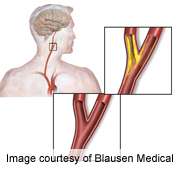(HealthDay)—Carotid artery plaque morphology and composition determined by magnetic resonance imaging (MRI) may be useful in predicting cardiovascular events, according to research published in the May issue of Radiology.
Anna E.H. Zavodni, M.D., of the University of Toronto, and colleagues used MRI to evaluate carotid plaque morphology and composition and ultrasound (US) to measure carotid wall thickness in 946 participants of the Multi-Ethnic Study of Atherosclerosis. The authors assessed the use of these vascular imaging findings to predict cardiovascular events in asymptomatic subjects.
The researchers found that US measurement of carotid intima-media thickness (IMT) and MRI measurements of remodeling index, lipid core, and calcium in the internal carotid artery were significant predictors of cardiovascular events according to univariate analysis (P < 0.001 for all). For traditional cardiovascular risk factors, the C statistic for event prediction was 0.696. For MRI measurements of remodeling index and lipid core, the C statistic was 0.734, and the net reclassification improvement (NRI) was 7.4 percent for participants with cardiovascular events and 15.8 percent for those without cardiovascular events (P = 0.02). For US measurements of IMT, the NRI in addition to traditional risk factors was not significant.
"The identification of vulnerable plaque characteristics with magnetic resonance imaging aids in cardiovascular disease prediction and improves the reclassification of baseline cardiovascular risk," the authors write.
More information:
Abstract
Full Text (subscription or payment may be required)
Journal information: Radiology
Copyright © 2014 HealthDay. All rights reserved.




















